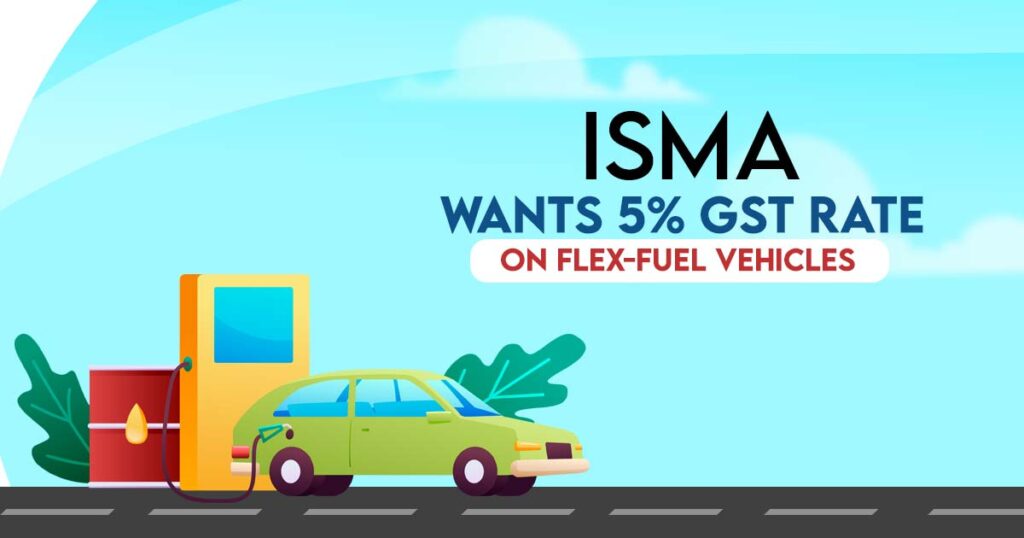
The country after attaining the target of 10% ethanol blending is now focusing on achieving a 20% blending by 2025-26. Industry stakeholders emphasize the significance of implementing measures such as equalizing GST rates to encourage the adoption of Flex Fuel Vehicles (FFVs), recognizing their crucial role in achieving this objective.
Currently, FFVs face a GST rate of 28 per cent, in contrast to the 5 per cent GST rate applied to electric vehicles (EVs). Achieving GST parity would directly contribute to reducing the nation’s fuel expenses while concurrently mitigating carbon emissions from the transportation sector, according to a statement from the Indian Sugar Mills Association (ISMA).
ISMA has formally appealed to the Ministry of Road Transport and Highways, advocating for a relaxation in the Goods and Services Tax (GST) for Flex-Fuel Vehicles (FFVs).
Acknowledging the importance of FFVs as a pivotal tool for a more environmentally friendly future, the industry underscores the vital necessity for fiscal balance. Currently, FFVs are subjected to a GST rate of 28 per cent, a notable contrast to the 5 per cent GST rate applicable to electric vehicles (EVs).
Read Also:- GST Impact on Petroleum Products in India
We urge for uniformity in the GST reduction for FFVs, a step that would recognize their ecological significance and empower consumers to readily adopt eco-conscious choices without facing disproportionate financial burdens.
Providing tax incentives for FFVs could stimulate the uptake of eco-friendly vehicles, encouraging a more sustainable transportation alternative, stated Aditya Jhunjhunwala, President of ISMA.
ISMA has also communicated with the Automotive Research Association of India (ARAI), an organization dedicated to developing blends of anhydrous ethanol with gasoline.
They have urged for a comprehensive exploration of the unexplored potential inherent in hydrous ethanol blends known as E-100. Drawing inspiration from Brazil’s successful implementation of such blends, India has the opportunity to envision a future automotive landscape in which cleaner fuel alternatives seamlessly integrate, ushering in a transformative era focused on sustainability.
Recommended:- GST Impact on Cars and Spare Parts Industry in India
Advantages of E-100
The numerous advantages offered by ethanol-based fuel are substantial and wide-ranging. These blends mark a significant era of environmental awareness by substantially reducing greenhouse gas emissions, decreasing reliance on fossil fuels, and improving air quality.
This bold stride aligns seamlessly with the global narrative of transitioning towards sustainable energy practices, positioning India as a guiding light in the realm of sustainable energy practices.
The inherent economic viability of ethanol compared to traditional gasoline serves to further enhance its reputation as a commendable alternative. The cost superiority of E-100 hydrous ethanol over fuel ethanol not only facilitates consumer-friendly pricing but also accelerates the shift towards environmentally conscious choices without imposing financial restrictions.
Additionally, the costs involved in producing E-100 (hydrous ethanol) are notably lower, encompassing both operational and capital expenses, in comparison to the production of fuel ethanol (anhydrous ethanol with 99.6 percent purity), which is utilized for blending with petrol.
Similar – Govt Switches GST Rate on Ethanol for Fuel Blending Promotion
This economic edge can subsequently be passed on to consumers through reduced prices for ethanol-blended petrol.
ISMA expects an exciting collaborative journey, working alongside governmental entities and industry partners, to transform the aspiration of a greener and sustainable future into a vibrant reality.








